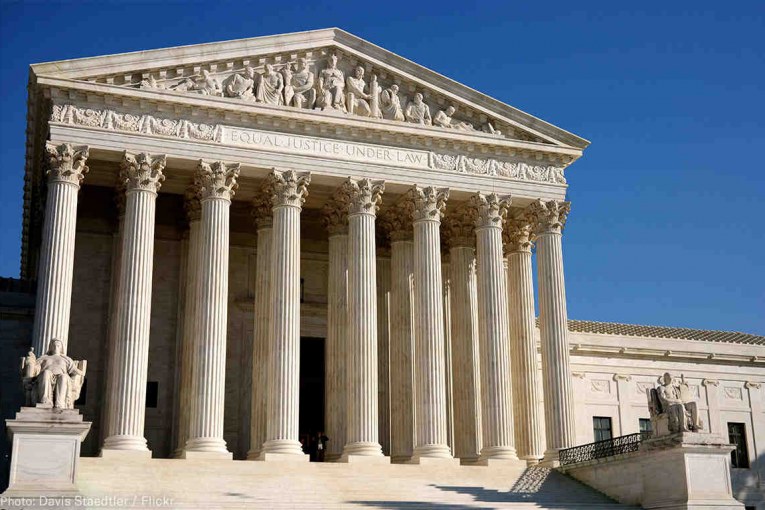

By Alex Jimenez and Brandon Blanco
WASHINGTON. DC – The U.S. Supreme Court last week ruled against prison inmates’ rights to win release from prison, and took a step further to bar federal courts from holding evidentiary hearings or evidence from previous case convictions.
The case, Shinn v Ramirez, stemmed from two Arizona prison inmates, David Martinez Ramirez and Barry Lee Jones, who are currently on death row for two separate murders and challenged the legality of their sentencings.
The six conservative Supreme Court Justices sided with the appellant in the case, Director of Arizona Department of Corrections David Shinn et al, while the three liberal justices dissented from the majority.
Supreme Court Justice Clarence Thomas wrote the majority opinion, stating that Arizona’s federal district erred in considering new evidence by the inmate’s defense that their defense lawyers during criminal proceedings failed to cite “ineffective assistance of counsel” in post-conviction proceedings.
Thomas concluded that evidence can be presented in federal courts only if it was already presented at the state level which oversaw the case.
Justice Sonia Sotomayor wrote the dissenting opinion, calling the majority opinion “perverse” that will have a “devastating outcome” for the two prisoners.
Regarding the larger implications of this decision, she said the outcome will have a “devastating outcome” beyond the two in the case decided last Monday.
“The Court understates, or ignores altogether, the gravity of the state systems’ failures in these two cases,” Sotomayor wrote.
“To put it bluntly: Two men whose trial attorneys did not provide even the bare minimum level of representation required by the Constitution may be executed because forces outside of their control prevented them from vindicating their constitutional right to counsel. It is hard to imagine a more ‘extreme malfunctio[n]’ … than the prejudicial deprivation of a right that constitutes the ‘foundation for our adversary system,’” Sotomayor said.
The attorney for both men, Robert Loeb, expressed his displeasure with the decision, noting “today is a sad day.”
According to Loeb there was evidence that the assertion the conviction was based on was “scientifically untrue” in the Barry Jones case.
“It’s also tragic,” he said, for David Ramirez, who faces the death penalty absent of a court to hear “the powerful mitigating evidence” of his intellectual disability along with the abuse he suffered as a child that would have prevented the death penalty to be imposed.
“The Court’s ruling leaves the fundamental constitutional right to trial counsel with no effective mechanism for enforcement in these circumstances.”
Arizona Attorney General Mark Brnovich however tweeted, “I applaud this decision because it will help refocus society on achieving justice for victims, instead of endless delays that allow convicted killers to dodge accountability.”
Ramirez was convicted for fatally stabbing his girlfriend and her then 15-year-old daughter in 1989 and also confessed to raping the daughter amid police evidence.
In his habeas corpus petition, Ramirez argued that his trial lawyer was ineffective by failing to perform a complete “mitigation investigation. Any evidence obtained could have stopped Ramirez from receiving the death penalty.
Jones was convicted for fatally beating and sexually assaulting his girlfriend’s four-year-old daughter in 1994. In his habeas corpus petition filed in federal court Jones’ new lawyer argued that the trial attorney failed to investigate evidence that would have shown injuries sustained to the daughter leading to her death were injuries not sustained while under his care.
The new lawyer also alleged that the original post-conviction attorney who “lacked the minimum qualifications for lawyers appointed for capital cases,” failed to look into the ineffectiveness of assistance provided by the trial attorney.
Initially the Arizona federal district court ruled that the claims of ineffectiveness of assistance of counsel were barred in federal court as they had not been properly presented in state court post-conviction.
A district judge later ruled that Ramirez was allowed to supplement the state record “with evidence not presented in state court to support his case to excuse the procedural default,” Monday’s ruling noted.
Jones’ case entailed a lengthy hearing where the evidence of ineffective assistance was carefully considered. The Supreme Court was asked to step in by the state of Arizona in its appeal of rulings in federal court.
The state argued that the federal habeas law does not allow a federal court “to order evidentiary development” on the grounds that “postconviction counsel is alleged to have negligently failed to develop the state-court record.”
Thomas’ ruling agreed.
“We now hold that … a federal habeas court may not conduct an evidentiary hearing or otherwise consider evidence beyond the state-court record based on ineffective assistance of state postconviction counsel,” according to Thomas
Thomas further added that “serial relitigation of final convictions undermines the finality that ‘is essential to both the retributive and deterrent functions of criminal law.’”
Sotomayor in her dissent acknowledged the six amendments under the constitution which guarantee criminal defendants the right to “effective assistance of counsel at trial.”
“This Court has recognized that right as ‘a bedrock principle’ that constitutes the very ‘foundation for our adversary system’ of criminal justice,” Sotomayor wrote.
“Today, however, the Court hamstrings the federal courts’ authority to safeguard that right,” she wrote.
“The Court’s decision will leave many people who were convicted in violation of the Sixth Amendment to face incarceration or even execution without any meaningful chance to vindicate their right to counsel,” the justice added.
The attorney for both men, Loeb, expressed his concern that while federal court may have evidence “that someone, like Barry Jones, did not commit the crime supporting the death sentence,” but the courts would be unable to step in.
Lastly Loeb called on Congress to remedy this problem he believes the “Court has created.
“The decision misreads the federal statute, produces untenable results never envisioned by Congress, and amounts to an assault on basic fairness in the criminal justice system,” Loeb said. I call on Congress to immediately fix the problem the Court has created today.”

